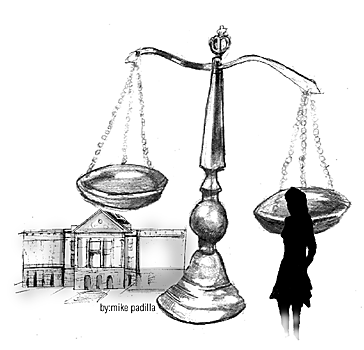
Illustration by Mike Padilla
|
|
By Rui Wang
Arizona Daily Wildcat
Wednesday, April 13, 2005
Print this
The young woman in a pink suit was sitting down as she spoke into her microphone but still made eye contact with the audience. Participating in a crime victims panel yesterday at the James E. Rogers College of Law, she described the shame she felt after being acquaintance-raped during her freshman year at the UA. She described the "downward spiral" of guilt and depression as she kept the secret for a year, thinking it was her fault, because she happened to know the man who raped her.
On Friday, in response to public outcry and prosecutors' pressure, the Arizona Legislature revived a bill that would make spousal rape equivalent to any other form of rape in the eyes of Arizona law. Although the bill specifically addresses spousal rape, it represents progress toward the characterization of all rapes as equally unacceptable and dehumanizing.
Hooray for the progressive Arizona Legislature.
Under the new measure, the maximum sentence for a spousal rape conviction will be bumped up from just a year and a half to 14 years: the same as rape of a non-spouse.
April is Sexual Assault Awareness Month and this week is Crime Victims Awareness Week. On Saturday, a UA student reported a rape at the Sigma Pi fraternity house. It's timely and crucial for rape issues to be at the forefront of Arizona consciousness.
Barring any tie-ups, the bill will be sent back to the Senate and then on to Gov. Napolitano for ratification.
The legislative change would be a step forward for spousal rape victims, victims' advocates and prosecutors. Spousal rape is often more violent and more repetitive, and its effects are exacerbated by the intimacy between spouses. Spousal rape also represents a tiny drop in the bucket of total reported rapes. There have only been 30 reported in Maricopa County in the last five years.
Despite the small tangible impact of this change on the criminal system, the real significance of the bill should be the implicit message it conveys: that rape is rape, regardless of the relationship between parties. This act of breaking down distinctions based on marital status will hopefully aid in the break down of distinctions and stigmatizations between all forms and types of rape.
This includes the social perception that date rape or acquaintance rape is somehow different from, or more acceptable than, raping a stranger. Date rape is the most underreported form of rape.
According to national Department of Justice statistics, only 39 percent of rapes or assaults are ever reported. Of that number, a dismally small percentage actually gets reported to law enforcement.
Here at the UA, eight sexual offenses have been reported since January. Seven of the offenses involved an acquaintance; only one involved a stranger. According to Tina Tarin, the violence prevention specialist of the OASIS Center program on campus, that figure represents only "a small, small percentage of what is actually happening."
She attributes a lot of the underreporting to the way society treats victims of an acquaintance rape: Based on high-profile cases and celebrity trials, "you see that people who are alleging an assault ... they basically get ripped to shreds."
For example, the accuser in the Kobe Bryant case was put through the wringer by the media and many individuals who believed that because she went to the basketball star's room, she was asking for it.
Another reason acquaintance rapes go unreported is that it is often linked to alcohol use. Many victims may think, "It was my fault because I was drinking." This is a perception that is patently untrue but persists particularly among underage students.
Acts of rape that occur between two men is also something that is notoriously underreported because of the dual stigma of rape and homosexuality, even though it may have nothing to do with actual sexuality and is what Tarin refers to as a "crime of anger."
We all may play a more crucial role than we realize. A friend is the most likely person a rape victim confides in, and that "first person they disclose to makes a huge difference," according to Tarin. Depending on whether that friend reacts with concern and support, or if they react with disapproval and scorn, the victim may or may not come forward to a crisis center or to law enforcement based on that initial reaction.
Today, that young woman in the pink suit is living by herself and working at the Southern Arizona Center Against Sexual Assault. I can only begin to imagine the process she's gone through in the past seven years. By passing the spousal rape legislation, the state of Arizona is doing its small part in acknowledging and saluting her experience and many others' - married or unmarried, strangers or friends.
- Rui Wang is a third-year law student. She can be reached at letters@wildcat.arizona.edu.
